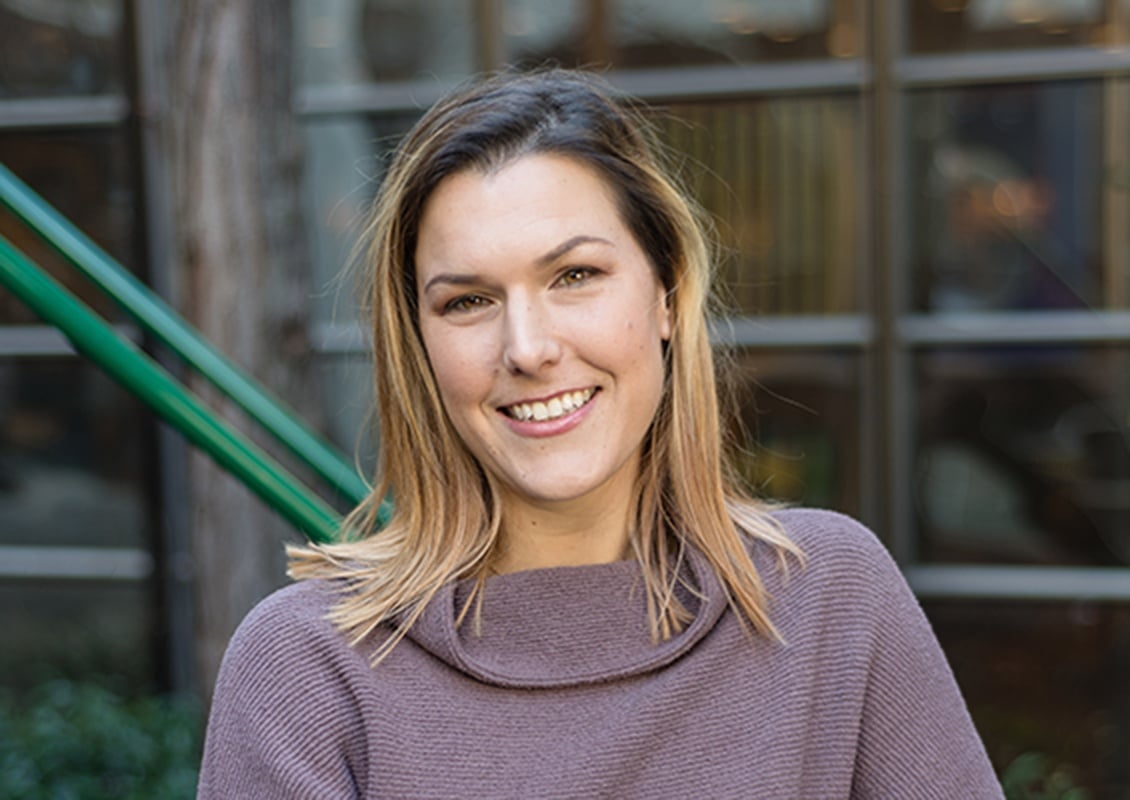As Chief of Hospital Medicine for Oklahoma City-based INTEGRIS Medical Group, Kate Mansalis, MD, EMBA 18, treats patients, leads physicians, and strengthens patient-provider relationships. She uses the skills and business savvy gained in the Berkeley MBA for Executives program to continuously improve her part of the healthcare landscape.
What attracted you to working in healthcare?
I’m drawn to two things about it. One, I’m a lifelong learner, and working in healthcare requires you to continue learning to stay on top of your game. Two, it’s a service-oriented field. From my military service to working in healthcare, I’ve always been interested in helping others. If I wasn’t doing this, I’d be working in another form of service.
Why did you want to move from being an individual contributor to a leadership role?
Healthcare is a big ecosystem of policies, procedures, and strategies. Often the rules and regulations that affect how we do our jobs are generated by people without a clinical background. Without good clinical leadership, we can lose sight of the fact that there is a patient at the center of any changes we make. Our industry is changing so much, and I believe we need more leadership from physicians and nurses to steer it in the right direction.
What challenges do physicians face when moving into leadership?
As a physician you’re accustomed to playing the short game. You make a change—either a patient medication or procedure—and very soon afterward, you see a result. The challenge of moving into a leadership position is that your mindset has to shift to the long game. Tactics and strategies you implement today may not produce results for months.
Another challenge is that the soft skills vital to being a good leader are not modeled in medical school. Many physicians were trained in the era of ‘the doctor is the boss.’ That doesn’t work when you’re leading a group of sentient adults who have opinions of their own. Healthcare is becoming more of a team model where soft skills such as communication and change management are needed.
I chose an MBA because I wanted to step back from the healthcare system to see what the rest of industry was doing to solve their problems."
Which Haas courses and faculty helped to prepare you for the work you do now?
Healthcare is becoming an increasingly data-driven field as we move toward evidence-based medicine. Data and Decisions, taught by Lucas Davis, showed me how to interpret the data that comes out of the daily operational analysis of our system.
Peter Goodson’s class, Turnarounds: Effective Leadership in Crisis, covered strategy, operations, and finance. Outside of my clinical work, those are the three areas where I spend most of my time—developing strategy, observing our system operations, and evaluating budgets and then using that finance background to develop business plans around service lines.
What Career Management Group services helped you achieve your goals?
Luke Kreinberg helped us explore what was important to us and what opportunities were available based on our interests and backgrounds. The Career Management Group (CMG) connected me with career counselor Joni Minault, who helped me identify my perfect job. When interviewing for the position I’m in now, I had reservations about it. Joni helped me realize that this was the job I had wanted to do. That helped me feel more confident about my decision.

How are you working to improve the patient-provider relationship?
I manage a group of hospitalists, which are general internists who see only patients admitted to the hospital. One hospitalist may have patients on six different floors. That requires interacting with a variety of nurses, care managers, and other members of the healthcare team. So we’ve started unit-based rounding, which places one physician, one nurse, and one care manager in a single unit that tends to the same patients. That team is then able to provide more continuity for patients and their families, as well as the bedside nursing staff. It’s really improved communication within the care team and made a difference in efficiency and the provider-patient experience. We’ve been doing this for about six months, and we’re already seeing an increase in patient satisfaction scores.
How has your son Connor’s rare genetic disorder informed your view of the patient side of care?
It’s shown me the vulnerability experienced by someone reliant on a broken and fragmented system. Connor has all his care in one network, but there’s still no streamlined process to get care when he needs it without jumping through hoops involving insurance, scheduling, and coverage changes. My husband and I are physicians, so we can just text someone if Connor urgently needs to see a pediatric neurologist. Without our professional connections, we probably would have to go to the ER and have him admitted to the hospital or wait weeks to months to get an appointment. That’s just criminal in my mind. We also have the financial resources to pay for his therapy. But, for many patients, that would be nearly impossible.
What advice do you have for those seeking to be physician leaders?
I think you need a solid clinical background and experience in order to have a true understanding of the system and the caregivers you will lead. Establish yourself in that first. There’s also the need for an advanced degree. I chose an MBA because I wanted to step back from the healthcare system to see what the rest of industry was doing to solve their problems.









